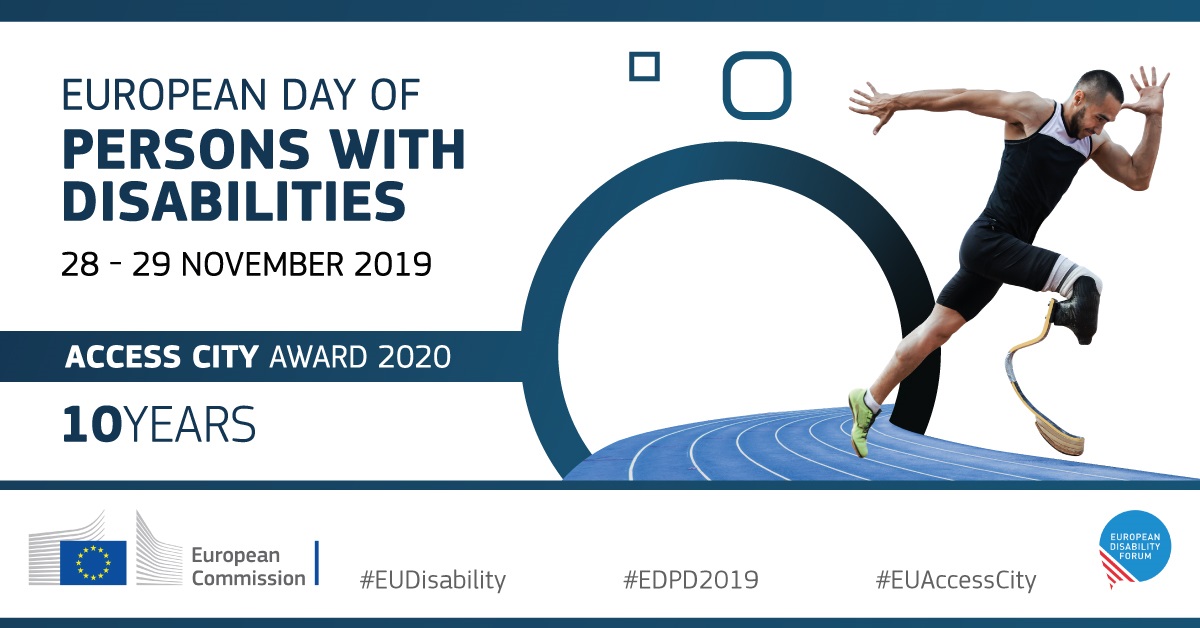 Written by Marie Lecerf,
Written by Marie Lecerf,
On 3 December each year, the European Commission, together with the European Disability Forum, organises a conference to mark the European Day of Persons with Disabilities, and 2019 marks the 27th anniversary of this day. The conference brings together decision-makers, people with and without disabilities, experts, the media and other stakeholders. Alongside and in support of national policies, the European Union (EU) has introduced a series of initiatives, programmes and strategies to improve the situation of disabled people over a number of decades.
Statistics – Disability in the European Union
According to the latest available data, in 2012, there were at least 70 million people aged 15 years and over with disabilities in the European Union (EU-27), corresponding to 17.6 % of the population aged 15 years and over. This share is likely to increase with an ageing population, given that people are more prone to develop disabilities with age.
First steps – ‘Equality of opportunity for people with disabilities’
In 1996, the European Commission published a communication entitled ‘Equality of Opportunity for People with Disabilities – A New European Community Disability Strategy’. Later on, an action programme to combat discrimination (2001-2006) was adopted to stimulate the introduction of specific measures to tackle discrimination. As an additional step, in May 2001, the European Commissioner for Social Affairs called on the European Council to dedicate the year 2003 to disabled people.
Legal basis – including disability in EU charters and treaties
As the EU paid closer attention to the situation of disabled people, the question of the legal basis on which it would introduce a genuine EU disability policy became increasingly important.
The European treaties enshrine the rights of persons with disabilities since 1997.. Article 19 of the Treaty on the Functioning of the European Union (TFEU, ex-Article 13 TEC) sets out that ‘in defining and implementing its policies and activities, the Union shall aim to combat discrimination based on sex, racial or ethnic origin, religion or belief, disability, age or sexual orientation’.
Moreover, Article 26 of the Charter of Fundamental Rights of the European Union, proclaimed in Nice in December 2000, is dedicated to the professional and social integration of persons with disabilities. Having come into effect in 2009, the Treaty of Lisbon attributed the same legal value to the Charter as to the Treaties.
International dimension – the Convention on the Rights of Persons with Disabilities
The United Nations Convention on the Rights of Persons with Disabilities (UNCRPD) was adopted on 13 December 2006. The convention is the first international legally binding instrument, which sets minimum standards for rights for people with disabilities and the first human rights convention to which the EU became a party.
By ratifying the UNCRPD in 2010, the EU associated itself with the efforts agreed at international level to guarantee the fundamental rights of disabled people. The measures taken in the Member States to guarantee compliance with the Charter must be guided by the need to enable disabled people to lead a normal life and be socially integrated on an equal level with others.
A strategy – the European Disability Strategy 2010-2020
To continue its activities, the EU published a new ‘European Disability Strategy 2010-2020′ to enable disabled people to enjoy their rights in full and to participate in society and the economy on an equal footing with others. It draws on the UNCRPD and complements the Europe 2020 Strategy and the Charter of Fundamental Rights of the EU. The action plan covers eight areas: accessibility, participation, equality, employment, education, social protection and inclusion, health and external actions.
More and more EU initiatives and actions – assisting people with disabilities
- The EU adopted a directive in November 2000 to promote equal treatment in employment and work. It recognises that the failure to provide ‘reasonable accommodation’ in the workplace could constitute discrimination;
- After nine years of debate, the EU adopted a directive on transport in 2001, which obliges bus manufacturers to provide access for people with reduced mobility;
- To encourage cities to improve accessibility, the European Commission presents annual awards to the most accessible cities;
- A European disability card scheme is being piloted in eight Member States (Belgium, Cyprus, Estonia, Finland, Italy, Malta, Slovenia and Romania), and should enable persons with disabilities have better access to culture, sports and leisure;
- The provisions of the Erasmus+ programme (2014-2020) promote disabled students’ mobility;
- Disabled people also benefit from the Directive on cross-border healthcare;
- The revision of the Audiovisual Media Services Directive encourages media service providers to ensure that their services gradually become accessible to people with a visual or hearing disability. The Directive on web accessibility, which seeks to make the websites of public sector bodies accessible to everybody, and the new Directive on the accessibility of goods and services are also key aspects in the promotion of accessibility for disabled people.
An advocate – the Disability Intergroup
The Disability Intergroup of the European Parliament is an informal grouping of Members of the European Parliament who are interested in promoting disability policy. Established in 1980, it is one of the oldest and largest intergroups in the European Parliament.
The Intergroup has been a key player in advocating for and advancing the rights of persons with disabilities in the EU. This new legislature provides an opportunity for the Intergroup to maintain its instrumental position on the adoption of legislation favourable to persons with disabilities.
Further information
Information on disability is available in various European Parliament Think Tank publications. Further details concerning people with disabilities are available on the webpage of the European Union Agency for Fundamental Rights and on the What Europe does for me website.








[…] Source Article from https://epthinktank.eu/2019/12/01/european-day-of-persons-with-disabilities/ […]